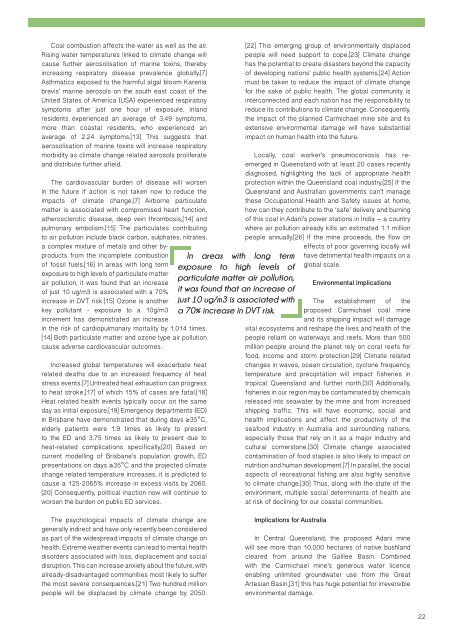Vector Volume 11 Issue 2 - 2017
Create successful ePaper yourself
Turn your PDF publications into a flip-book with our unique Google optimized e-Paper software.
Coal combustion affects the water as well as the air.<br />
Rising water temperatures linked to climate change will<br />
cause further aerosolisation of marine toxins, thereby<br />
increasing respiratory disease prevalence globally.[7]<br />
Asthmatics exposed to the harmful algal bloom Karenia<br />
brevis’ marine aerosols on the south east coast of the<br />
United States of America (USA) experienced respiratory<br />
symptoms after just one hour of exposure. Inland<br />
residents experienced an average of 3.49 symptoms,<br />
more than coastal residents, who experienced an<br />
average of 2.24 symptoms.[13] This suggests that<br />
aerosolisation of marine toxins will increase respiratory<br />
morbidity as climate change related aerosols proliferate<br />
and distribute further afield.<br />
The cardiovascular burden of disease will worsen<br />
in the future if action is not taken now to reduce the<br />
impacts of climate change.[7] Airborne particulate<br />
matter is associated with compromised heart function,<br />
atherosclerotic disease, deep vein thrombosis,[14] and<br />
pulmonary embolism.[15] The particulates contributing<br />
to air pollution include black carbon, sulphates, nitrates,<br />
a complex mixture of metals and other byproducts<br />
from the incomplete combustion<br />
of fossil fuels.[16] In areas with long term<br />
exposure to high levels of particulate matter<br />
air pollution, it was found that an increase<br />
of just 10 ug/m3 is associated with a 70%<br />
increase in DVT risk.[15] Ozone is another<br />
key pollutant - exposure to a 10g/m3<br />
increment has demonstrated an increase<br />
in the risk of cardiopulmonary mortality by 1.014 times.<br />
[14] Both particulate matter and ozone type air pollution<br />
cause adverse cardiovascular outcomes.<br />
Increased global temperatures will exacerbate heat<br />
related deaths due to an increased frequency of heat<br />
stress events.[7] Untreated heat exhaustion can progress<br />
to heat stroke,[17] of which 15% of cases are fatal.[18]<br />
Heat related health events typically occur on the same<br />
day as initial exposure.[19] Emergency departments (ED)<br />
in Brisbane have demonstrated that during days ≥35°C,<br />
elderly patients were 1.9 times as likely to present<br />
to the ED and 3.75 times as likely to present due to<br />
heat-related complications specifically.[20] Based on<br />
current modelling of Brisbane’s population growth, ED<br />
presentations on days ≥35°C and the projected climate<br />
change related temperature increases, it is predicted to<br />
cause a 125-2065% increase in excess visits by 2060.<br />
[20] Consequently, political inaction now will continue to<br />
worsen the burden on public ED services.<br />
In areas with long term<br />
exposure to high levels of<br />
particulate matter air pollution,<br />
it was found that an increase of<br />
just 10 ug/m3 is associated with<br />
a 70% increase in DVT risk.<br />
[22] This emerging group of environmentally displaced<br />
people will need support to cope.[23] Climate change<br />
has the potential to create disasters beyond the capacity<br />
of developing nations’ public health systems.[24] Action<br />
must be taken to reduce the impact of climate change<br />
for the sake of public health. The global community is<br />
interconnected and each nation has the responsibility to<br />
reduce its contributions to climate change. Consequently,<br />
the impact of the planned Carmichael mine site and its<br />
extensive environmental damage will have substantial<br />
impact on human health into the future.<br />
Locally, coal worker’s pneumoconiosis has reemerged<br />
in Queensland with at least 20 cases recently<br />
diagnosed, highlighting the lack of appropriate health<br />
protection within the Queensland coal industry.[25] If the<br />
Queensland and Australian governments can’t manage<br />
these Occupational Health and Safety issues at home,<br />
how can they contribute to the ‘safe’ delivery and burning<br />
of this coal in Adani’s power stations in India – a country<br />
where air pollution already kills an estimated 1.1 million<br />
people annually.[26] If the mine proceeds, the flow on<br />
effects of poor governing locally will<br />
have detrimental health impacts on a<br />
global scale.<br />
Environmental Implications<br />
The establishment of the<br />
proposed Carmichael coal mine<br />
and its shipping impact will damage<br />
vital ecosystems and reshape the lives and health of the<br />
people reliant on waterways and reefs. More than 500<br />
million people around the planet rely on coral reefs for<br />
food, income and storm protection.[29] Climate related<br />
changes in waves, ocean circulation, cyclone frequency,<br />
temperature and precipitation will impact fisheries in<br />
tropical Queensland and further north.[30] Additionally,<br />
fisheries in our region may be contaminated by chemicals<br />
released into seawater by the mine and from increased<br />
shipping traffic. This will have economic, social and<br />
health implications and affect the productivity of the<br />
seafood industry in Australia and surrounding nations,<br />
especially those that rely on it as a major industry and<br />
cultural cornerstone.[30] Climate change associated<br />
contamination of food staples is also likely to impact on<br />
nutrition and human development.[7] In parallel, the social<br />
aspects of recreational fishing are also highly sensitive<br />
to climate change.[30] Thus, along with the state of the<br />
environment, multiple social determinants of health are<br />
at risk of declining for our coastal communities.<br />
The psychological impacts of climate change are<br />
generally indirect and have only recently been considered<br />
as part of the widespread impacts of climate change on<br />
health. Extreme weather events can lead to mental health<br />
disorders associated with loss, displacement and social<br />
disruption. This can increase anxiety about the future, with<br />
already-disadvantaged communities most likely to suffer<br />
the most severe consequences.[21] Two hundred million<br />
people will be displaced by climate change by 2050.<br />
Implications for Australia<br />
In Central Queensland, the proposed Adani mine<br />
will see more than 10,000 hectares of native bushland<br />
cleared from around the Galilee Basin. Combined<br />
with the Carmichael mine’s generous water licence<br />
enabling unlimited groundwater use from the Great<br />
Artesian Basin,[31] this has huge potential for irreversible<br />
environmental damage.<br />
22

















